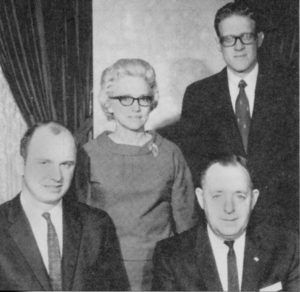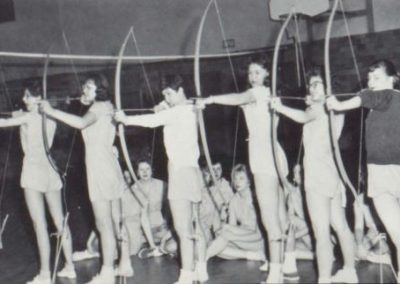 The 1960s
The 1960s
The decade began with a challenge from a youthful president to “… ask what you can do for your country,” and a Baptist minister from Georgia dreaming of a day when children would “not be judged by the color of their skin, but by the content of their character.”
Some would argue it was a decade of turmoil, defined by increasing racial strife with change coming quickly. The decade was marked by assassinations, the Cuban missile crisis, fire hoses, police dogs, the Gulf of Tonkin resolution, anti-war protests and cities burning during summers of discontent. But, amidst the perceived chaos, there were the Beatles, Neil Armstrong’s moonwalk, the Miracle Mets, Head Start, the Voting Rights Act and Sesame Street.
The WASB

By the end of the 1960s, the WASB had four employees: (left to right) Senn Brown (publications director), Margaret Brill (office manager), George Tipler (executive secretary) and Ken Cole (special services director)
- 1961: The WASB directors approve hiring Madison attorney James Clark as special counselor. His first Legal Comment for the association focuses on open meetings and is published in that year’s October Wisconsin School Board News. The law firm, now called Boardman and Clark, continues to be the association’s legal counsel.
- 1965: The WASB sponsors the first “legislative drive-in” in May, designed to update members on pertinent federal and state legislation.
- 1967: The WASB directors approve renting office space in Madison.
- 1968: The WASB hires Senn Brown as publications director and Ken Cole to assist members on personnel issues. Senn would become the association’s first dedicated lobbyist and remain with the association until retiring in the early 1990s. Ken would become the association’s second executive director, retiring in 2005.
WASB Presidents
1960 – Dorothy Branham – Rice Lake
1961 – T.G. Holthusen – Stevens Point
1962 – T.G. Holthusen – Stevens Point
1963 – Harold Wentzel – Kimberly
1964 – Harold Wentzel – Kimberly
1965 – Ben Guthrie – Lac du Flambeau
1966 – Ben Guthrie – Lac du Flambeau
1967 – Robert Ziemer – South Milwaukee
1968 – Robert Ziemer – South Milwaukee
1969 – Jack Butler – Stevens Point
Our State
- 1961: Gov. Gaylord Nelson signs the nation’s first mandatory seatbelt law for front-seat passengers.
- 1961:The Menominee Indian Reservation becomes the state’s 72nd county.
- 1964: Cooperative Educational Service Agencies (CESAs) are created, authorizing 19 regional offices to provide education services. Each operating board of control is comprised of area school board members.
- 1965: The state’s school compulsory attendance age is raised to 18.
- 1966: Kathryn Clarenbach of Madison is elected the first chairwoman of the National Organization for Women.
- 1967: The oleomargarine ban is repealed; and the Green Bay Packers defeat the Kansas City Chiefs in the first Super Bowl.
- 1969: Milwaukee priest James Groppi and welfare reform advocates take over the state Assembly chambers demanding more help for the poor.
Our Nation
- 1960: NASA launches the first weather satellite.
- 1962: Rachel Carson’s “Silent Spring” is published, describing the adverse effects of DDT and ushering in the modern environmental movement.
- 1963: The world is introduced to “Little Stevie Wonder, the 12-Year-Old Genius” by Motown and Maurice Sendak’s whimsical book “Where the Wild Things Are.”
- 1964: The U.S. Surgeon General’s cigarette report maintains, “Many kinds of damage to body functions, and to organs, cells and tissues occur more frequently and severely in smokers.”
- 1965: “The Sound of Music” starring Julie Andrews sets box office records while the Rolling Stones release “(I Can’t Get No) Satisfaction.”
- 1966: Bill Russell of the Boston Celtics becomes the highest paid ($125,000) and first black coach in professional sports.
- 1967: Great-grandson of a slave, Thurgood Marshall is appointed to the U.S. Supreme Court.
- 1968: “Mister Rogers’ Neighborhood” debuts on the Public Broadcasting System, focusing on children’s social/emotional growth.


